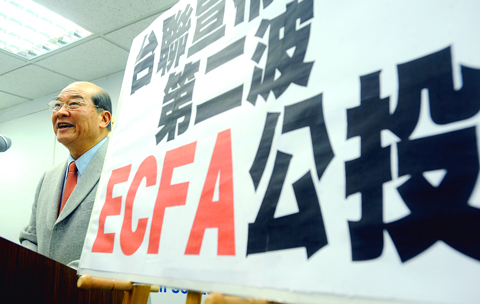The Executive Yuan’s Committee of Appeal has upheld the Referendum Review Committee’s denial of a request from the Democratic Progressive Party (DPP) to put the government’s planned economic cooperation framework agreement (ECFA) with China to a referendum.
If the DPP refuses to accept the decision, it could appeal to the Taipei High Administrative Court within two months.
Committee of Appeal chairman Chen Ter-shin (陳德新) refused to comment on the case yesterday, referring questions to the written decision posted on the commission’s Web site.

PHOTO: LIN CHENG-KUN, TAIPEI TIMES
DPP PROPOSAL
The DPP wants a referendum to ask the question: “Do you agree that the government should put the ECFA that Taiwan plans to sign with China to a referendum?”
The Referendum Review Committee turned down the petition by a vote of 13 to 4 with two abstentions on Aug. 27 last year.
The Committee of Appeal said it considered the rationale behind the Referendum Review Committee’s decision valid — that voters cannot express their approval or disapproval of the proposed ECFA because it lacks substantial content.
QUESTION OF CONTENT
“The substantive content of the ECFA will be decided by [ongoing cross-strait] negotiation,” the decision states.
“The content is still under deliberation and thus it is unclear. Given that, it is not a subject to ask people their opinions about,” the decision states.
In its appeal, the DPP objected to another reason given by the Referendum Review Committee — that the referendum subject did not fall under one of the four categories applicable for a national referendum: Referendum of laws, initiative of legislative principles, initiative or referendum of import policies, or referendum to amend the Constitution.
The DPP said in its appeal that the ECFA, which concerns the economic sovereignty of the country and major rights and obligations of the people, was a matter of initiative of legislative principles and a matter of important policies.
BIAS CLAIM
Saying that the question it asked was more concrete and clearer than the two previous referendums initiated by the Chinese Nationalist Party (KMT), the DPP said the Referendum Review Committee had been prejudiced in making its decision.
The first KMT-initiated referendum referred to was held in January 2008 and asked voters if they would agree to authorize the legislature to investigate officials suspected of corruption.
The second one was held in March 2008 and asked voters if the nation should apply to return to the UN under the name “Republic of China” or any other practical and dignified title.
The Committee of Appeal also sided with the Referendum Review Committee on this point, saying there was no comparison between the DPP’s proposal and the previous referendum subjects.

DEFENSE: The National Security Bureau promised to expand communication and intelligence cooperation with global partners and enhance its strategic analytical skills China has not only increased military exercises and “gray zone” tactics against Taiwan this year, but also continues to recruit military personnel for espionage, the National Security Bureau (NSB) said yesterday in a report to the Legislative Yuan. The bureau submitted the report ahead of NSB Director-General Tsai Ming-yen’s (蔡明彥) appearance before the Foreign and National Defense Committee today. Last year, the Chinese People’s Liberation Army (PLA) conducted “Joint Sword-2024A and B” military exercises targeting Taiwan and carried out 40 combat readiness patrols, the bureau said. In addition, Chinese military aircraft entered Taiwan’s airspace 3,070 times last year, up about

A magnitude 4.3 earthquake struck eastern Taiwan's Hualien County at 8:31am today, according to the Central Weather Administration (CWA). The epicenter of the temblor was located in Hualien County, about 70.3 kilometers south southwest of Hualien County Hall, at a depth of 23.2km, according to the administration. There were no immediate reports of damage resulting from the quake. The earthquake's intensity, which gauges the actual effect of a temblor, was highest in Taitung County, where it measured 3 on Taiwan's 7-tier intensity scale. The quake also measured an intensity of 2 in Hualien and Nantou counties, the CWA said.

The Overseas Community Affairs Council (OCAC) yesterday announced a fundraising campaign to support survivors of the magnitude 7.7 earthquake that struck Myanmar on March 28, with two prayer events scheduled in Taipei and Taichung later this week. “While initial rescue operations have concluded [in Myanmar], many survivors are now facing increasingly difficult living conditions,” OCAC Minister Hsu Chia-ching (徐佳青) told a news conference in Taipei. The fundraising campaign, which runs through May 31, is focused on supporting the reconstruction of damaged overseas compatriot schools, assisting students from Myanmar in Taiwan, and providing essential items, such as drinking water, food and medical supplies,

New Party Deputy Secretary-General You Chih-pin (游智彬) this morning went to the National Immigration Agency (NIA) to “turn himself in” after being notified that he had failed to provide proof of having renounced his Chinese household registration. He was one of more than 10,000 naturalized Taiwanese citizens from China who were informed by the NIA that their Taiwanese citizenship might be revoked if they fail to provide the proof in three months, people familiar with the matter said. You said he has proof that he had renounced his Chinese household registration and demanded the NIA provide proof that he still had Chinese